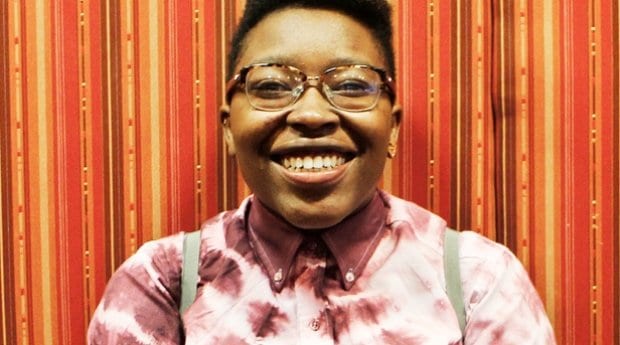Ade B got onstage in front of hundreds of people and performed a conversation that’s never taken place.
Her spoken-word performance, which was one of the highlights at this year’s Day of Pink gala, was about coming out to her family, something the British-Nigerian poet hasn’t yet done.
“I’m actually not out to my family, so I wrote that kind of as a confessional,” Ade B says. “Having to hide such an essential part of me that affects so many facets of my life is kind of almost a daily struggle.”
Her mother lives in London with her brothers, and she has extended family in the United States and Nigeria, where her father lived until he passed away. Despite being geographically separated, her family is close, and not being out to them is difficult, she says.
“I think about doing it all the time, but it’s just a lot of ramifications,” she says. “I wanted to explore not only the theme of coming out, but how coming out for a West African kid is different than a kid who’s been raised in the West or like a white kid. It’s not quite the same because there’s kind of colonial history and ways that religion has been used to oppress these communities.”
While Ade B is staunchly against homophobia and other forms of oppression — and calls out family members and anyone who says homophobic or oppressive things — she says it’s equally important to consider homophobia’s origins.
“My family’s very religious and very Christian, but historically that’s not West African culture,” she says. “In West African culture, homosexuality was never really seen as a bad thing, but I’ve been raised that it is, and that’s why I explored the theme of forgiveness in my poem, because as much as I can be angry that I can’t be out to them or that they say homophobic things around me, I always have to understand that it’s not completely just hate.”
There are times when queer community members forget that although they experience discrimination because of their sexual orientation or gender identity, they can simultaneously be privileged, Ade B says. From white queer people making comments like “I wouldn’t date a black girl” to self-identified liberals railing against homophobia in Africa without considering that homophobia was preached to them by Western evangelists, we all need to check our privilege from time to time, she says.
“Very liberal people think they can’t be racist because they understand what racism is, but because it’s so systemic an institution, it can still show itself in their behaviours without them even realizing,” she says. “A lot of people, when confronted with their privilege, it’s hard … I think that’s where a lot of the learning stops — people just don’t want to confront it.”
Having privilege doesn’t mean your life has been easy, but you still benefit from your privilege, she says. Instead of shying away from uncomfortable truths, we need to respectfully confront them. This is particularly true for artists, which is why she appreciated the safe space provided by Rainbow Write, the free writing program for LGBT youth funded by the Ontario Arts Council, Jer’s Vision and Planned Parenthood.
“You can write what you feel, and if it’s not okay, you get called out on it but not in a way that’s [disparaging],” she says.
The 24-year-old’s future plans include doing more spoken-word performances and writing a zine. She also DJs and is looking forward to performing drag at WorldPride in Toronto as Wesley Dykes-Darling.
Follow Ade B on Twitter @KindaDapper and on Facebook: Wesley Dykes-Darling.


 Why you can trust Xtra
Why you can trust Xtra


